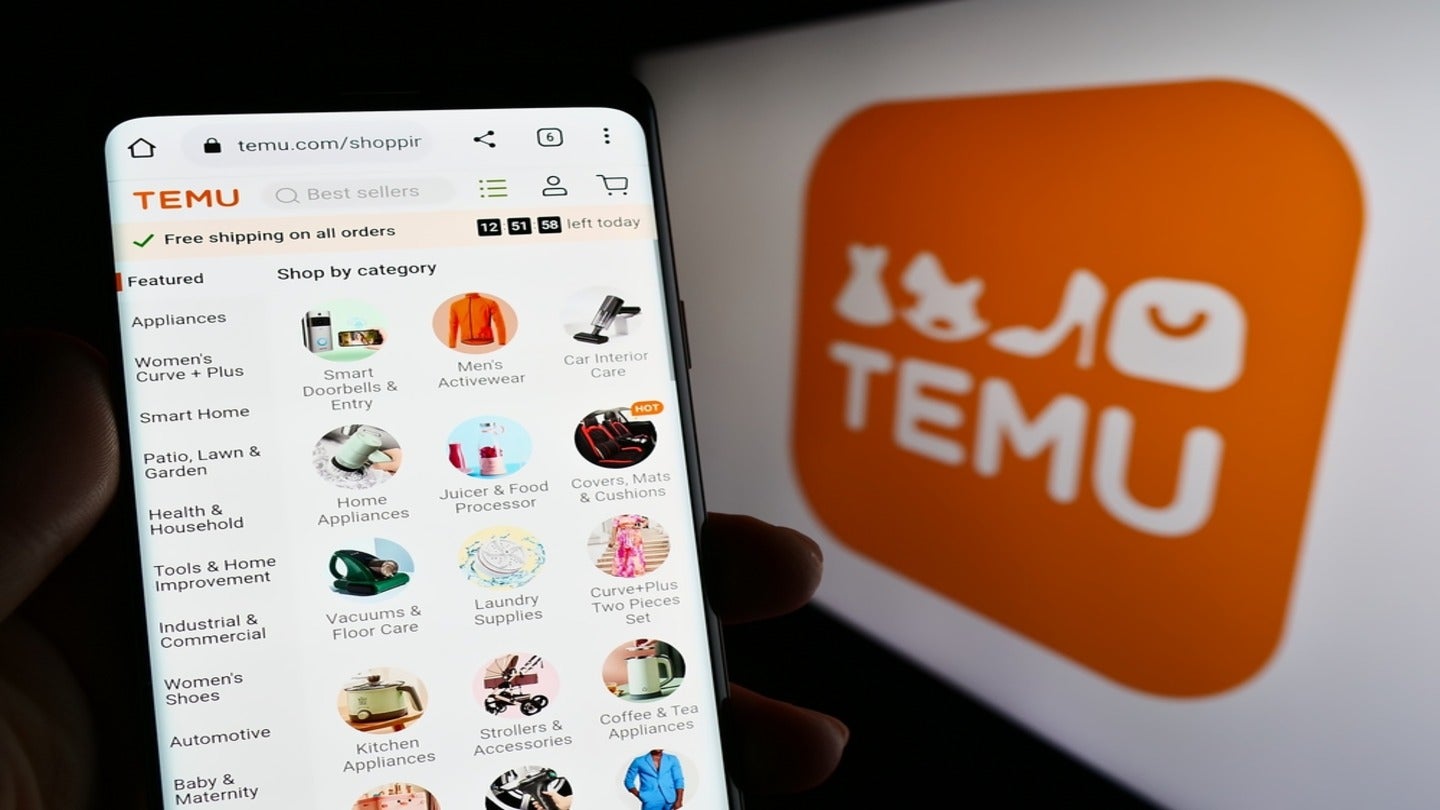
Temu’s garish orange packages are becoming an increasingly common sight in couriers’ delivery consignments as inflation-weary consumers lap up the impossibly low prices.
A magnetic “weight loss” beaded anklet for 89p ($1.09), costume jewellery for 57p, a blood oxygen monitor for £1, self-warming socks for £2, inflatable Halloween eyeballs for £1.09 – God’s gift to the permanently excitable TikToker with their copious hauls of plastic tat.
Perhaps more than any other e-commerce platform, Temu traps its users in an incomplete satisfaction, compelling them after newer, better products that they never knew they needed. Rock-bottom prices are enabled by its factory-to-consumer business model, while permanent flashing banners advertise 70% discounts, warn of low stock and tell users who has just bought or rated an item.
Now, Temu, the Western offshoot of China’s e-commerce platform Pinduoduo, has become the most downloaded app across some of the world’s largest economies, and GlobalData’s social media analytics show a steady rise in mentions of the platform.
Meanwhile, mobile analytics firm GWS found that between April and July 2023, Amazon’s US user numbers crashed dramatically, falling from 54 million to 46 million users per day. Temu, by contrast, added nearly 10 million new daily users since the beginning of the year, tying for the second most used shopping app with Walmart at around 17 million.
Temu also dominates in terms of amount of time spent on the app, with users spending an average of 20 minutes in contrast to Amazon’s 12 minutes.
In the UK, Amazon lost one million daily app users between January and July, while Temu saw its daily mobile user number grow sharply to 3.5m just one month after launch.
Amazon, however, seems largely unphased. In June, it decided to exclude Temu from its price-checking algorithm, saying that it does not meet its fair pricing policy standards in light of copyright infringement accusations. There are currently several pending US lawsuits between Amazon sellers and Temu.
The two e-commerce giants might also appear to target different customer segments. Amazon stocks more expensive, high-value and branded goods whereas Temu’s products are largely unbranded and rarely exceed £20.
While Amazon built its reputation on superhuman efficiency and customer service, Temu’s Trustpilot page teams with complaints of data privacy breaches, incomplete orders, a difficult returns process, long delivery times and poor quality.
One may also wonder about the sustainability of Temu’s success. Temu owes at least part of its recent fortunes to its gamified advertising and expensive marketing, having splurged millions of dollars on two 30-second Super Bowl ads with the catchy tagline: “Shop like a billionaire.” It has also been running hugely unprofitable margins in a bid to lure buyers. China Merchants Securities calculations show that under conservative assumptions of a $2.5bn gross merchandise volume, Temu’s annual losses amount to $0.56bn.
Temu is also facing scrutiny over its handling of user data. In its 2022 Notorious Markets for Counterfeiting and Piracy report, the Office of the United States Trade Representative gave Pinduoduo its own section, and was later removed from the Google Play Store because of suspected malware. However, retail analyst Bruce Winder has said that abstract ideas such as data privacy, sustainability and labour standards rarely predominate when consumers are in desperate straits.
Indeed, Patrick O’Brien, Global Retail Research Director at GlobalData, says that Temu nevertheless poses a very real threat to Amazon: “As Amazon is more about being a platform for other retailers, it does not have the ability to use price levers in the same way it did when it first started and was focussed on selling its own products.”
“Temu is building a very competitive marketplace by connecting buyers worldwide with Chinese manufacturers who send the products directly from China, utilising loopholes in customs charges by dealing typically in very low-cost items.”
“Amazon may have to consider cutting commission rates and advertising fees in order to entice such sellers onto its platform, but they will also be mindful of the need to protect its own brand – products on Temu's website have been accused of not meeting Western safety, quality, ethical and copyright standards. Amazon has faced similar issues but has put in place a number of measures to counter such criticism.”
The nascent rivalry between Temu and Amazon has yet to reach its zenith. Only time will tell whether the former’s “shop like a billionaire” business model will weaken the Bezos empire.
Our signals coverage is powered by GlobalData’s Thematic Engine, which tags millions of data items across six alternative datasets — patents, jobs, deals, company filings, social media mentions and news — to themes, sectors and companies. These signals enhance our predictive capabilities, helping us to identify the most disruptive threats across each of the sectors we cover and the companies best placed to succeed.


